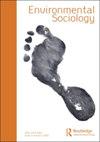Beyond migration: a critical review of climate change induced displacement
IF 2.8
Q3 ENVIRONMENTAL STUDIES
引用次数: 2
Abstract
ABSTRACT Scholarship on displacement caused by the effects of climate change generally approaches displacement as the involuntary movement of people. However, in this article, we argue that there are uncertainties surrounding Climate Change Induced Displacement (CCID) that are partly caused by discursive ambiguity around the notion of ‘displacement’ – a concept that remains poorly defined in the context of climate change research – and a conflation between displacement due to quick-onset disaster events and the cumulative pressure of living in an environment marked by a disrupted climate. Reflecting on the impacts of the Australian bushfires in 2019–20, we conceptualise CCID beyond migration as an event and a physical relocation across geographical space. Even fast-onset disaster events, such as the Australian bushfires, can dispossess and displace beyond the immediate threat of the fire front; but this displacement is not necessarily aligned with movement and migration, nor is it evenly proportioned across populations. Based on a review of existing literature on CCID, we identify three key tensions shaping scholarship on CCID: conceptualisation; distribution of risk and impact; and discursive framing. Together, we contend, these tensions highlight the imperative of striving for conceptual clarity and awareness of distributional inequities of risk and vulnerabilities.移民之外:对气候变化引起的流离失所问题的批判性审查
关于气候变化影响导致的流离失所问题的奖学金通常将流离失所视为人员的非自愿流动。然而在本文中,我们认为,气候变化引发的流离失所(CCID)存在不确定性,部分原因是围绕“流离失所”这一概念(在气候变化研究中,这一概念的定义仍然很差)的争论含糊不清,以及快速发生的灾难事件导致的流离失所与在环境中生活的累积压力之间的混淆以气候紊乱为特征。考虑到2019-20年澳大利亚丛林大火的影响,我们将CCID概念化为一种超越移民的事件和跨越地理空间的物理迁移。即使是快速发生的灾难事件,如澳大利亚的丛林大火,也可能使其丧失并转移到火线的直接威胁之外;但这种流离失所并不一定与流动和移民相一致,也不一定在人口中均匀分布。基于对现有CCID文献的回顾,我们确定了影响CCID学术的三个关键张力:概念化;风险和影响的分布;以及话语框架。我们认为,这些紧张局势共同突出了努力实现概念清晰和对风险和脆弱性分配不平等的认识的必要性。
本文章由计算机程序翻译,如有差异,请以英文原文为准。
求助全文
约1分钟内获得全文
求助全文
来源期刊

Environmental Sociology
ENVIRONMENTAL STUDIES-
CiteScore
4.60
自引率
12.00%
发文量
34
期刊介绍:
Environmental Sociology is dedicated to applying and advancing the sociological imagination in relation to a wide variety of environmental challenges, controversies and issues, at every level from the global to local, from ‘world culture’ to diverse local perspectives. As an international, peer-reviewed scholarly journal, Environmental Sociology aims to stretch the conceptual and theoretical boundaries of both environmental and mainstream sociology, to highlight the relevance of sociological research for environmental policy and management, to disseminate the results of sociological research, and to engage in productive dialogue and debate with other disciplines in the social, natural and ecological sciences. Contributions may utilize a variety of theoretical orientations including, but not restricted to: critical theory, cultural sociology, ecofeminism, ecological modernization, environmental justice, organizational sociology, political ecology, political economy, post-colonial studies, risk theory, social psychology, science and technology studies, globalization, world-systems analysis, and so on. Cross- and transdisciplinary contributions are welcome where they demonstrate a novel attempt to understand social-ecological relationships in a manner that engages with the core concerns of sociology in social relationships, institutions, practices and processes. All methodological approaches in the environmental social sciences – qualitative, quantitative, integrative, spatial, policy analysis, etc. – are welcomed. Environmental Sociology welcomes high-quality submissions from scholars around the world.
 求助内容:
求助内容: 应助结果提醒方式:
应助结果提醒方式:


